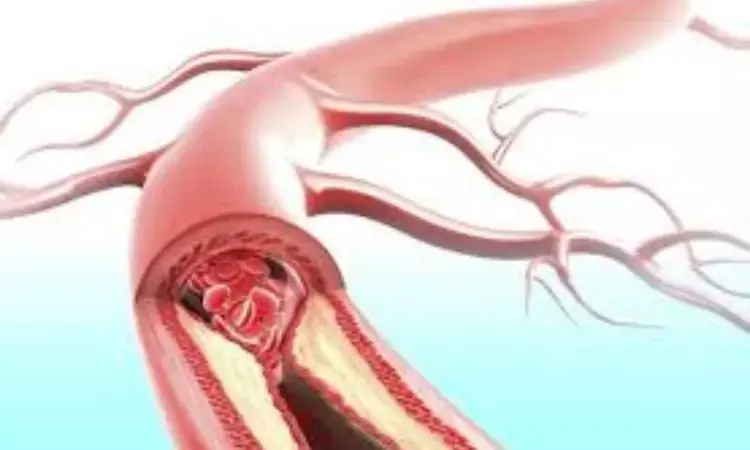- Home
- Medical news & Guidelines
- Anesthesiology
- Cardiology and CTVS
- Critical Care
- Dentistry
- Dermatology
- Diabetes and Endocrinology
- ENT
- Gastroenterology
- Medicine
- Nephrology
- Neurology
- Obstretics-Gynaecology
- Oncology
- Ophthalmology
- Orthopaedics
- Pediatrics-Neonatology
- Psychiatry
- Pulmonology
- Radiology
- Surgery
- Urology
- Laboratory Medicine
- Diet
- Nursing
- Paramedical
- Physiotherapy
- Health news
- Fact Check
- Bone Health Fact Check
- Brain Health Fact Check
- Cancer Related Fact Check
- Child Care Fact Check
- Dental and oral health fact check
- Diabetes and metabolic health fact check
- Diet and Nutrition Fact Check
- Eye and ENT Care Fact Check
- Fitness fact check
- Gut health fact check
- Heart health fact check
- Kidney health fact check
- Medical education fact check
- Men's health fact check
- Respiratory fact check
- Skin and hair care fact check
- Vaccine and Immunization fact check
- Women's health fact check
- AYUSH
- State News
- Andaman and Nicobar Islands
- Andhra Pradesh
- Arunachal Pradesh
- Assam
- Bihar
- Chandigarh
- Chattisgarh
- Dadra and Nagar Haveli
- Daman and Diu
- Delhi
- Goa
- Gujarat
- Haryana
- Himachal Pradesh
- Jammu & Kashmir
- Jharkhand
- Karnataka
- Kerala
- Ladakh
- Lakshadweep
- Madhya Pradesh
- Maharashtra
- Manipur
- Meghalaya
- Mizoram
- Nagaland
- Odisha
- Puducherry
- Punjab
- Rajasthan
- Sikkim
- Tamil Nadu
- Telangana
- Tripura
- Uttar Pradesh
- Uttrakhand
- West Bengal
- Medical Education
- Industry
Study Reveals Link Between Coronary Atherosclerotic Plaque Activity and Myocardial Infarction Risk

UK: In a landmark study published in the Journal of the American College of Cardiology, researchers have uncovered a crucial link between coronary atherosclerotic plaque activity and the risk of myocardial infarction (MI), commonly known as a heart attack. The findings offer critical insights into the mechanisms underlying cardiovascular (CV) events, potentially revolutionizing the prevention and treatment of heart disease.
In patients with recent MI and multivessel coronary artery disease (CAD), coronary atherosclerotic plaque activity prognosticates individual coronary arteries and patients at risk for myocardial infarction, the study revealed.
"We observed a link between vessel-level coronary atherosclerotic plaque activity and subsequent vessel-level MI among heart attack survivors," the researchers wrote.
Previous studies have shown that total coronary atherosclerotic plaque activity across the entire coronary arterial tree is associated with patient-level clinical outcomes. Kang-Ling Wang, Centre for Cardiovascular Science, University of Edinburgh, Edinburgh, United Kingdom, and colleagues aimed to determine if vessel-level coronary atherosclerotic plaque activity is associated with vessel-level myocardial infarction.
For this purpose, the researchers conducted a secondary analysis of an international multicenter study of patients with recent MI and multivessel coronary artery disease, in which they assessed vessel-level coronary atherosclerotic plaque activity using coronary 18F-sodium fluoride positron emission tomography to identify vessel-level myocardial infarction.
The following were the key findings of the study:
- The researchers found increased 18F-sodium fluoride uptake in 679 of 2,094 coronary arteries and 414 of 691 patients.
- Myocardial infarction occurred in 4% of vessels with increased coronary atherosclerotic plaque activity and 2% of vessels without increased coronary atherosclerotic plaque activity (HR: 2.08). This association was not demonstrable in those treated with coronary revascularization (HR: 1.02) but was notable in untreated vessels (HR: 3.86).
- Increased coronary atherosclerotic plaque activity in multiple coronary arteries was associated with heightened patient-level risk of cardiac death or myocardial infarction (HR: 2.43) as well as first (HR: 2.19) and total (HR: 2.50) myocardial infarctions.
The implications of this research are profound, offering a paradigm shift in the approach to cardiovascular risk assessment and management. By incorporating assessments of coronary plaque activity into clinical practice, healthcare providers can identify individuals at heightened risk of myocardial infarction and tailor interventions to address underlying pathophysiological mechanisms. Ultimately, this could lead to significant improvements in cardiovascular outcomes and a reduction in the burden of heart disease worldwide.
"These findings provide the foundations for strategies to individualize patient risk and enhance preventative treatment using coronary atherosclerotic plaque activity," the researchers concluded.
Reference:
Wang, K., Balmforth, C., Meah, M. N., Daghem, M., Moss, A. J., Tzolos, E., Kwiecinski, J., Molek-Dziadosz, P., Craig, N., Bularga, A., Adamson, P. D., Dawson, D. K., Arumugam, P., Sabharwal, N. K., Greenwood, J. P., Townend, J. N., Calvert, P. A., Rudd, J. H., Verjans, J. W., . . . Newby, D. E. (2024). Coronary Atherosclerotic Plaque Activity and Risk of Myocardial Infarction. Journal of the American College of Cardiology, 83(22), 2135-2144. https://doi.org/10.1016/j.jacc.2024.03.419
Dr Kamal Kant Kohli-MBBS, DTCD- a chest specialist with more than 30 years of practice and a flair for writing clinical articles, Dr Kamal Kant Kohli joined Medical Dialogues as a Chief Editor of Medical News. Besides writing articles, as an editor, he proofreads and verifies all the medical content published on Medical Dialogues including those coming from journals, studies,medical conferences,guidelines etc. Email: drkohli@medicaldialogues.in. Contact no. 011-43720751


